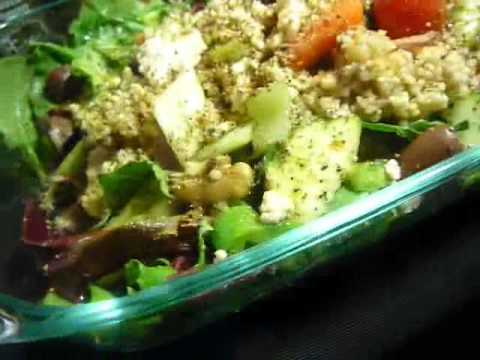Since recently attending the Annual Greek Festival (Delicious vegetarian food there too such as: Spanakopita, Vegetarian Dolmathes, Pilafi, Etc! ) on the West Coast, what better way to represent for the Greeks by creating my spin on the classic “Greek Salad”! A Greek salad usually consist of olives & goat cheese! This salad I created is a powerhouse of nutritional value from omega 3’s, antioxidants, all 9 essential amino acids, tons of vitamins & minerals! For the guys, this is the type of food you eat to keep your sexual stamina top notch & keep the blood flowing to that organ that makes ladies dance & sing in the bedroom! “OPA! (Greek shout)” LMAO!
This salad contains: black pepper, cayenne pepper, kalamata olives, honey, walnuts, carrots, millet, quinoa, spinach, grape tomatoes, celery, cucumber, zucchini, goat cheese, bell peppers, red onions, olive oil, cinnamon & various herbs & spices!
• Kalamata Olives: Naturally ripened Kalamata olives are rich in a pigment called anthocyanin, which has antioxidant and anti-inflammatory properties. This pigment is almost absent in cured black olives where the color is developed artificially by iron, a color stabilizer.
• Goat cheese: People who are lactose intolerant are sometimes able to tolerate goat cheese even if they have problems digesting cheese made from cow’s milk. The levels of lactose are similar, but the fat molecules in goat cheese are shorter, making them more digestible. Even people who don’t have a lactose intolerance will find that goat cheese appears to be more easily digested than conventional dairy products.
• Quinoa: Complete protein! Quinoa contains all 9 essential amino acids that are required by the body as building blocks for muscles. Magnesium helps relax your muscles and blood vessels and effects blood pressure. Quinoa contains high levels of this vital nutrient. Quinoa is a wonderful way to ensure that you consume valuable fiber that eases elimination and tones your colon. Manganese and copper: Quinoa is a good source of these minerals that act as antioxidants in your body to get rid of dangerous cancer and disease-causing substances.
• Millet: Millet is highly nutritious, non-glutinous and like buckwheat and quinoa, is not an acid forming food so is soothing and easy to digest. In fact, it is considered to be one of the least allergenic and most digestible grains available and it is a warming grain so will help to heat the body in cold or rainy seasons and climates.
Millet is tasty, with a mildly sweet, nut-like flavor and contains a myriad of beneficial nutrients. It is nearly 15% protein, contains high amounts of fiber, B-complex vitamins including niacin, thiamin, and riboflavin, the essential amino acid methionine, lecithin, and some vitamin E. It is particularly high in the minerals iron, magnesium, phosphorous, and potassium.
• Walnuts: Walnuts not only taste great but are a rich source of heart-healthy monounsaturated fats and an excellent source of those hard to find omega-3 fatty acids. Like most nuts, they can easily be added to your Healthiest Way of Eating. Just chop and add to your favorite salad, vegetable dish, fruit, or dessert.
In a 1/4 cup of walnuts, it contains a daily value percentage of about 94.5% omega-3 fats; 42.5% manganese; and 20% copper!
• Spinach: This is a very nutrient-dense food. It’s low in calories yet very high in vitamins, minerals and other phytonutrients. When you consume this healthy food, you don’t need to worry about your weight-loss diet as you take in abundant, good-for-you nutrients. Spinach is loaded with flavonoids which act as antioxidants, protecting the body from free radicals. Researchers have discovered at least 13 different flavonoid compounds that act as anti-cancer substances. The various nutrients offer much in the way of disease protection.
• Zucchini: A one cup serving of zucchini contains over ten percent of the daily required amount of magnesium, a mineral which reduces the risk of heart attacks and stroke. Zucchini also provides folate, a vitamins needed to break down the dangerous amino acid called homocysteine. When the levels of homocysteine shoot up, the body is at risk of having either a heart attack or a stroke.
• Bell Pepper: While research studies have tended to focus on carotenoids as the hallmark antioxidants in bell pepper, this vegetable actually provides us with a very broad range of antioxidants. In terms of conventional nutrients, bell pepper is an excellent source of vitamin C at 117 milligrams per cup. (That’s more than twice the amount of vitamin C found in a typical orange.)
• Olive Oil: Organic olive oil is filled with antioxidants, vitamins and nutrients that may protect you against illnesses. Studies have shown that organic olive oil can help: Protect You from Heart Disease; Promote Healthy Digestion; Ease the Symptoms of Ulcers & Gastritis; Lower Gallstone Formation; & Balance the Fatty Acids in Your Body!

